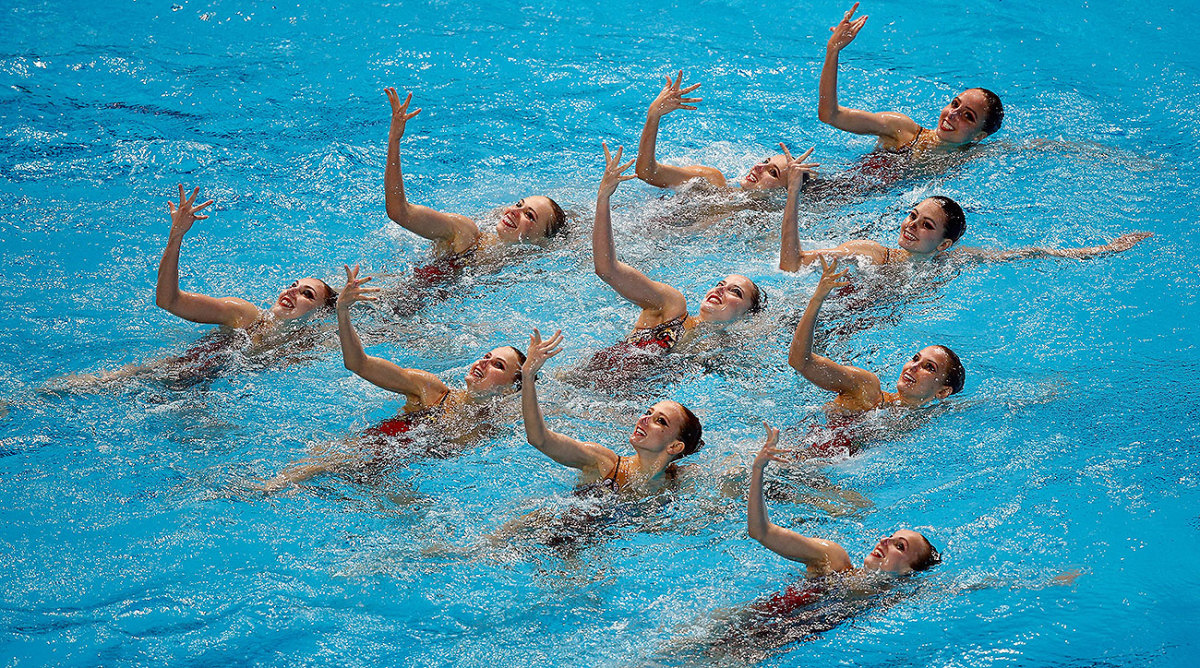
Synchronized swimming preview: Russians expected to sweep golds
At the 2012 Olympics, three countries—Russia, Spain and China—claimed the six medals awarded in synchronized swimming. But Spain, who won bronze in the team synchro event in 2012, won’t be defending their medal in the team event; they failed to clinch an Olympic spot at the qualifying event in March, meaning we’ll see a new country on the podium for the team event in Rio.
However, the Spanish duo of Ona Carbonell and Gemma Mengual will be competing in the duet event, looking to win at least one medal for their country. Both Carbonell and Mengual (who at age 39 came out of retirement to compete in Rio) have won Olympic silver medals in the duet with Andrea Fuentes—Carbonell in London and Mengual in Beijing.
Their biggest competition will be Russia’s Natalia Ishchenko and Svetlana Romashina, who won gold in both duet events at the 2015 world championships hosted in Kazan. Russia has simply dominated the sport of synchronized swimming at the international level; it won the team and duet gold medals for the last four Olympics, and the team took home eight of nine possible gold medals at worlds last year. Russia will be the heavy favorites in the team event, with China, Japan, Ukraine and Italy jonesing for podium spots.
• RIO OLYMPICS PREVIEWS: Men’s basketball | Women’s basketball | Rugby | Diving | Tennis | Triathlon | Men’s soccer | Women's soccer | Field hockey | Sailing | Wrestling | Table tennis
Synchronized swimming debuted at the 1984 Olympics with solo and duet competition; in ’96, both solo and duet events were dropped in favor of the team event, and then duet event returned in 2000. Synchro is one of two exclusively female Olympic sports (rhythmic gymnastics is the other), and athletes’ performances are judged based off three categories: execution, difficulty and artistic impression (choreography, musical interpretations and overall presentation).
In Rio, eight nations will compete in the team event, while 24 will participate in the duet competition. There are also two types of routines: technical and free. In technical routines, teams or pairs must execute a certain amount of required elements. Free routines focus more on the artistic and creative themes of the performance.
Sports Illustrated At The Games
Subscribe to SI's Olympic podcast coverage
Athletes / Teams to watch
Natalia Ishchenko and Svetlana Romashina, Russia
As mentioned above, Russia has simply dominated this sport over the last decade-plus internationally, and Ishchenko and Romashina are the heart of the Russian team. At the 2015 world championships, Romashina brought home four gold medals (solo technical routine, duet technical routine, duet free routine and free routine combination) while Ishchenko won three golds (solo free routine, duet technical routine, duet free routine). It will be a huge upset if these women don’t bring home duet gold. If they win gold medals in both the team and duet events in Rio, they will tie fellow Russian Anastasia Davydova as the most decorated synchronized swimmer.
Mariya Koroleva and Anita Alvarez, USA
After experiencing success on the collegiate level and winning a national title in the team event with Stanford, Koroleva competed at the 2012 Olympics with then-partner Mary Killman, where they finished 11th in the duet. But in early 2015, Koroleva paired up with Alvarez, and the pair finished sixth at the 2015 French Open just a few weeks later. Since the U.S. didn’t qualify a team for the Rio Games, Koroleva and Alvarez will be the sole American representatives in the synchronized swimming events.
Rainbows, Unicorns and a Shark: Link between Katie Ledecky, Missy Franklin
Huang Xuechen and Sun Wenyan, China
Huang has three Olympic medals to her name—2008 team bronze, ’12 duet bronze, ’12 team silver—and she looks to challenge the Russian’s domination of the sport in Rio with Sun.
Gold-medal dates
Duet—Aug. 16
Team—Aug. 19








